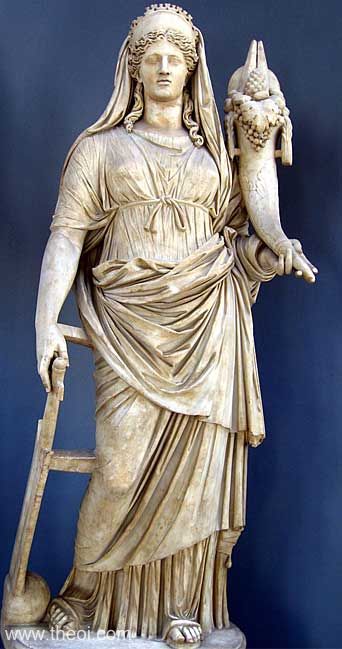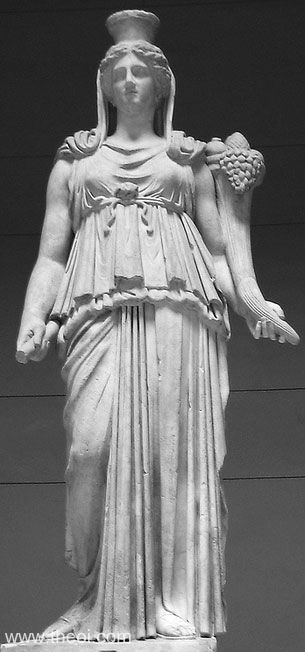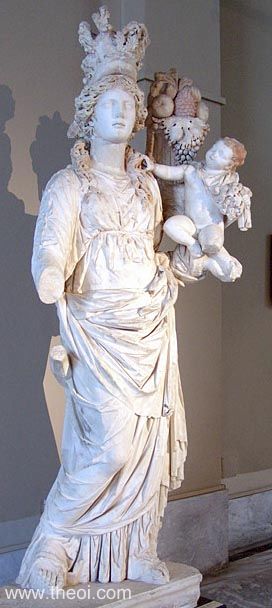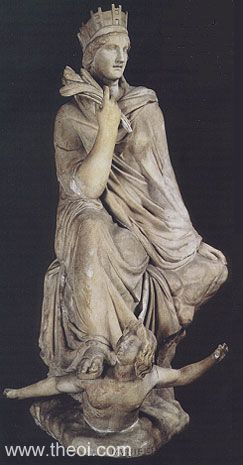TYKHE CULT
Greek Name
Τυχη
Transliteration
Tykhê
Latin Spelling
Tyche
Roman Name
Fortuna

TYKHE (Tyche) was the goddess of good fortune.
She was usually worshipped as the guardian spirit of a city's good fortune and her cult was fairly widespread. In this guise she was depicted with a turret-crown representing the city's walls and a horn of plenty brimming with the fruits of the earth.
Several images of Tykhe are presented on this page. In most representations she is barely distinguished from the goddess Demeter--the crown, cornucopia and child Ploutos were attributes shared by both goddesses. In many cases, Tykhe was probably viewed as simply an aspect of that goddess.
In the first two images (right and below) Tykhe has her three standard attributes of turret-crown, cornucopia and ship's rudder.
The third shows Tykhe carrying the infant Ploutos (Wealth) and a cornucopia in her arm. According to Pausanias a similar statue crafted by the Athenian sculptor Zenophon graced her temple in Thebes.
The fourth is a reduced marble copy of a colossal bronze statue of the goddess produced by the sculptor Eutyches for the Greek colony of Antioch in Syria. Here she is seated upon the back of the swimming river-god Orontes.
CLASSICAL LITERATURE QUOTES
CULT IN ATTICA (SOUTHERN GREECE)
I. ATHENS (ATHENAI) Main City of Attica (Attika)
Aelian, Historical Miscellany 9. 39 (trans. Wilson) (Greek rhetorician C2nd to 3rd A.D.) :
"One must admit that the following examples of love are ridiculous and bizarre . . . A young man at Athens, from a noble family, fell deeply in love with a statue of Agathe Tykhe (Good Fortune) standing near the Prytaneion. He flung his arms round the statue and kissed it, and then, losing his head and spurred on by a passion, he appeared before the Council declaring, with many an entreaty, that he was willing to buy the statue for a large sum. When he failed to persuade them, he put a large number of crowns and garlands on the statue, offered sacrifice, decorated it richly, and killed himself, after uttering prolonged lamentation." [N.B. The Prytaneion was the administrative centre of the city, where officials would also entertain.]
CULT IN MEGARIS (SOUTHERN GREECE)
I. MEGARA Main Town of Megaris
Pausanias, Description of Greece 1. 43. 6 (trans. Jones) (Greek travelogue C2nd A.D.) :
"Near the temple of Aphrodite [in Megara] is a sanctuary of Tykhe (Fortune), the image being one of the works of Praxiteles."
CULT IN CORINTHIA (SOUTHERN GREECE)
I. CORINTH (KORINTHOS) Main City of Corinthia (Korinthia)
Pausanias, Description of Greece 2. 2. 8 :
"There is also a temple of Tykhe (Fortune) [in Korinthos], with a standing image of Parian marble."
CULT IN SICYONIA (SOUTHERN GREECE)

I. SICYON (SIKYON) Main Town of Sicyonia (Sikyonia)
Pausanias, Description of Greece 2. 7. 5 :
"On the modern citadel [of Sikyon] is a sanctuary of Tykhe Akraie (of the Height), and after it one of the Dioskouroi. Their images and that of Tykhe are of wood."
II. TITANE Village in Sicyonia
Pausanias, Description of Greece 2. 11. 8 :
"In the portico [of the sanctuary of Asklepios at Titane in Sikyonia] are dedicated images of Dionysos and Hekate, with Aphrodite, the Meter Theon (Mother of the Gods), and Tykhe (Fortune). These are wooden, but Asklepios, surnamed Gortynios, is of stone."
CULT IN THE ARGOLIS (SOUTHERN GREECE)
I. ARGOS Main City of Argolis
Pausanias, Description of Greece 2. 20. 3 :
"[At Argos] is a temple of Tykhe (Fortune), which must be very old it if be the one in which Palamedes [mythical hero] dedicated the dice that he had invented."
II. HERMIONE City in Argolis
Pausanias, Description of Greece 2. 35. 3 :
"The sanctuary of Tykhe (Fortune) is said by the Hermionians [of Hermione, Argos] to be the newest in their city; a colossus of Parian marble stands there."
CULT IN MESSENIA (SOUTHERN GREECE)
I. PHARAE (PHARAI) Town in Messenia
Pausanias, Description of Greece 4. 30. 4 :
"The people of Pharia [in Messenia] possess also a temple of Tykhe (Fortune) and an ancient image."
CULT IN ELIS (SOUTHERN GREECE)
I. ELIS Main Town of Elis
Pausanias, Description of Greece 6. 25. 4 :
"The Eleans [in the city of Elis] have also a sanctuary of Tykhe (Fortune). In a portico of the sanctuary has been dedicated a colossal image, made of gilded wood except the face, hands and feet, which are of white marble. Here Sosipolis (City Saviour) too is worshipped in a small shrine on the left of the sanctuary of Tykhe."
II. OLYMPIA Village & Sanctuary in Elis
Pausanias, Description of Greece 5. 15. 6 :
"On entering the Wedge [at Olympia] itself you see altars of Tykhe (Good Luck), Pan and Aphrodite."
Pausanias, Description of Greece 5. 17. 3 :
"Here [in the temple of Hera at Olympia] too have been dedicted [statues of] Leto, Tykhe (Fortune), Dionysos and a winged Nike (Victory)."
Pausanias, Description of Greece 5. 15. 5 :
"[In the city of Elis] just inside the Beak is an altar of Tykhe Agathe (Good Fortune)."
CULT IN ACHAEA (SOUTHERN GREECE)

I. AEGEIRA (AIGEIRA) Town in Achaea (Akhaia)
Pausanias, Description of Greece 7. 26. 8 :
"I remember observing at Aigeira [in Akhaia] a building in which was an image of Tykhe (Fortune) carrying the horn of Amaltheia. By her side is a winged Eros (Love), the moral of which is that even success in love depends for mankind on fortune rather than on beauty. Now I am in general agreement with Pindar's ode, and especially with his making Tykhe one of the Moirai (Fates), and more powerful than her sisters."
CULT IN ARCADIA (SOUTHERN GREECE)
I. MEGALOPOLIS Main City of Arcadia (Arkadia)
Pausanias, Description of Greece 8. 30. 7 :
"[At Megalopolis, Arkadia is] a temple of Tykhe with a stone image not less than five feet high."
CULT IN BOEOTIA (CENTRAL GREECE)
I. THEBES Main City of Boeotia (Boiotia)
Pausanias, Description of Greece 9. 16. 2 :
"[At Thebes, Boiotia there] is a sanctuary of Tykhe (Fortune), who carries the child Ploutos (Wealth). According to the Thebans, the hands and face of the image were made by Zenophon the Athenian, the rest of it by Kallistonikos, a native. It was a clever idea of these artists to place Ploutos (Wealth) in the arms of Tykhe (Fortune), and so to suggest that she is his mother or nurse."
II. THESPIAE (THESPIAI) Village in Boeotia
Pausanias, Description of Greece 9. 26. 8 :
"[At Thespiai, Boiotia there is an] image of Tykhe (Fortune), and in another place that of Hygeia (Health) . . . Athene Ergane (Worker), as well as that of Ploutos (Wealth), stands beside her."
III. LEBADEIA Village in Boeotia
Pausanias, Description of Greece 9. 39. 4 :
"This is what happens at the oracle [of Trophonios in Lebadeia, Boiotia]. When a man decides to go down to Trophonios, he first lives a certain number of days in a building which is consecrated to Agathe Tykhe (Good Fortune) and the Daimon Agathos (Good Spirit). Living there he purifies himself."
CULT IN EPIRUS (NORTHERN GREECE)
I. STEPHANEPOLIS Town in Epirus (Epeiros)
Aelian, On Animals 12. 30 (trans. Scholfield) (Greek natural history C2nd to 3rd A.D.) :
"Tame fishes which answer to a call and gladly accept food are to be fond and are kept in many places, in Epeiros for instance, at the town formerly called Stephanepolis, in the temple of Tykhe (Fortune) in the cisterns on either side of the ascent."
CULT IN LYDIA (ASIA MINOR)
I. SMYRNA City in Aeolis - Lydia (Greek Colony)
Pausanias, Description of Greece 4. 30. 6 (trans. Jones) (Greek travelogue C2nd A.D.) :
"Bouplaos a skilful temple-architect and carver of images, who made the statue of Tykhe (Fortune) at Smyrna, was the first whom we know to have represented her with the heavenly sphere upon her head and carrying in one hand the horn of Amaltheia, as the Greeks call it, representing her functions to this extent."
CULT IN SYRIA (WEST ASIA)

I. ANTIOCH (ANTIOKHEIA) City in Syria (Greek Colony)
Pausanias, Description of Greece 6. 2. 7 (trans. Jones) (Greek travelogue C2nd A.D.) :
"A statue of Tykhe [made] for the Syrians on the Orontes, which is very much venerated by the local people."
[N.B. This Tykhe was a gilded bronze goddess in the act of being crowned; she sits enthroned with her feet on the river-god Orontes. There was a religious cult of Tykhe of cities. Her only known Greek festival was at Lampsakos, but she had an important cult at Antioch.]
The most famous likeness of Tykhe is the statue by Eutykhes (early 3rd century BC) it represents the city goddess of Antiochia: wearing the mural crown and clad in a loose-fitting mantle she is seated on a rock, with her right foot resting on the shoulder of the river god Orontes, who is emerging from the water. See image S18.2.
CULT IN SICILY (SOUTHERN ITALY)
I. HIMERA Town in Sicily (Sikelia)
Pindar, Olympian Ode 12. 1 ff (trans. Conway) (Greek lyric C5th B.C.) :
"Daughter of Zeus Eleutherios (the Liberator), Tykhe (Fortune) our saviour goddess, I pray your guardian care for Himera, and prosper her city's strength. For your hand steers the ships of ocean on their flying course, and rules on land the march of savage wars, and the assemblies of wise counsellors."
CULT IN CAMPANIA (SOUTHERN ITALY)
I. LATIN WAY Road in Campania
Strabo, Geography 5. 4. 11 (trans. Jones) (Greek geographer C1st B.C. to C1st A.D.) :
"The following are also Kampanaian (Campanian) cities [in Italy]--Kales and Teanon Sidikinon, whose territories are separated by the two temples of Tykhe (Fortune) situated on either side of the Latin Way."
CULT OF FORTUNA IN LATIUM (CENTRAL ITALY)
I. ROME Imperial Capital
Strabo, Geography 8. 6. 23 :
"And I may almost say that the most and best of the other dedicatory offerings at Rome came from there [the city of Korinthos which was sacked by the Romans]; and the cities in the neighborhood of Rome also obtained some; for Mummios, being magnanimous rather than fond of art, as they say, readily shared with those who asked. And when Leucullus built the Temple of Eutykhia (Good Fortune) [i.e. the Roman Fortuna] and a portico [in Rome], he asked Mummios for the use of the statues which he had, saying that he would adorn the temple with them until the dedication and then give them back. However, he did not give them back, but dedicated them to the goddess, and then bade Mummios to take them away if he wished. But Mummios took it lightly, for he cared nothing about them, so that he gained more repute than the man who dedicated them."
CULT TITLES & EPITHETS
Tykhe had a few cult titles such as Agathe Tykhe (Good Fortune) and Tykhe Akraie (Of the Heights) describing the location of one of her shrines:--
Greek Name
Αγαθη Τυχη
Ευτυχια
Ακραιη
Transliteration
Agathê Tykhê
Eutykhia
Akraiê
Latin Spelling
Agatha Tyche
Eutychia
Acraea
Translation
Good Fortune
Good Fortune
Of the Heights
Greek Name
Αυτοματια
Μειλιχιος
Σωτηερια
Transliteration
Automatia
Meilikhios
Sôtêria
Latin Spelling
Automatia
Meilichius
Soteria
Translation
Self-Animate
Gentle, Soothing
Saviour
ENCYCLOPEDIA TYCHE TITLES
AUTOMA′TIA (Automatia) a surname of Tyche or Fortuna, which seems to characterize her as the goddess who manages things according to her own will, without any regard to the merit of man. Under this name Timoleon built to the goddess a sanctuary in his house. (Plut. De Sui Laude, p. 542, e.; Nepos, Timol.)
MEILI′CHIUS (Meilichios), i. e. the god that can be propitiated, or the gracious, is used as a surname of several divinities. Of Tyche or Fortune. (Orph. Hymn. 71. 2.)
Source: Dictionary of Greek and Roman Biography and Mythology.
SOURCES
GREEK
- Pindar, Odes - Greek Lyric C5th B.C.
- Strabo, Geography - Greek Geography C1st B.C. - C1st A.D.
- Pausanias, Description of Greece - Greek Travelogue C2nd A.D.
- Aelian, On Animals - Greek Natural History C2nd - 3rd A.D.
- Aelian, Historical Miscellany - Greek Rhetoric C2nd - 3rd A.D.
BIBLIOGRAPHY
A complete bibliography of the translations quoted on this page.